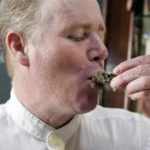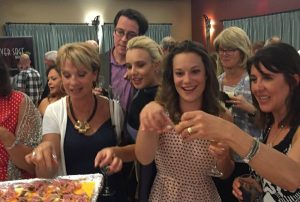In late February 2009, complaints from customers who suffered vomiting, diarrhea and flu-like symptoms began pouring celebrity chef Heston Blumenthal’s UK restaurant, the Fat Duck.
A report by the UK Health Protection Agency concluded that 529 patrons paying a ridiculous amount of money for food-porn styled dishes were sickened with Norovirus – this at a restaurant that only seats 40 patrons per night — introduced through contaminated shellfish, including oysters that were served raw and razor clams that may not have been appropriately handled or cooked.
Investigators identified several weaknesses in procedures at the restaurant that may have contributed to ongoing transmission including: delayed response to the incident, the use of inappropriate environmental cleaning products, and staff working when ill. Up to 16 of the restaurant’s food handlers were reportedly working with Norovirus symptoms before it was voluntarily closed
Last night, Heston appeared on Australian current affairs program, The Project, and left hosts and viewers scratching their heads.
Appearing on the show to promote the announcement of the world’s 50 best restaurants, Blumenthal was asked a simple question by Waleed Aly but gave the world’s most confusing answer, with some viewers joking he might have been on “acid.”
“What is it that makes a great restaurant?” Aly asked.
“This might seem a little tangential,” Blumenthal replied, which turned out to be the understatement of the year.
“Human beings became the most powerful species on the planet because through being able to imagine things that don’t exist we created shared beliefs. So all the things that happened after humans: religion, money, language, cultures, social media, fairy tales, they are very human being.
“The reason that happened was the brain trebled in size for lots of reasons but primarily through eating cooked food. It broke the food down and our gut changed and this [touches head] is on top of our body to protect, because this [touches neck] is where the next generation are prepared for life.”
Blumenthal’s answer was met with blank stares from The Project panelists, but the celebrity chef pushed on.
“And so the thing, we should be called omnivores or herbivores, we’re coctivores … we are interdependent beings,” he said.
“We’ve been able to work collectively in numbers larger than any other creature and our efficiency in group learning has become quicker, quicker, quicker, quicker. We don’t have to climb a mountain to get water every day, we don’t have to kill an animal to the death to feed our children.”
The Project’s resident smarty pants, Waleed Aly, interjected and said, “That explains why we like restaurants, but how do we tell the good ones from the bad ones?”
And Blumenthal was off again.
“We have two universes,” he said.
“We have our internal universe, our human being and we have our human doing. We have our feelings and our emotions and then we have getting on in life … The problem that’s happening is we are confusing the two things. We are thinking that our happiness is going to be developed by a numerical system … thank god we have because that’s what’s got us to where we’ve got to.
(Hang in there, it’s almost over)
“There’s a palliative care nurse that wrote a piece in The Guardian last year, the most common things, regrets people had while they were passing away and it was they wished they lived a life true to themselves,” Blumenthal said.
“If every human being had an ambition not to have that feeling, and that’s because our new brain that came from eating cooked food … starts to fade and then our raw emotion comes through and we realise, actually, this is about emotion. Food is about emotion.”
Food is also about sustenance, enjoyment, socializing, and not making one barf.
Heston is a master of both food and words to make one barf.











